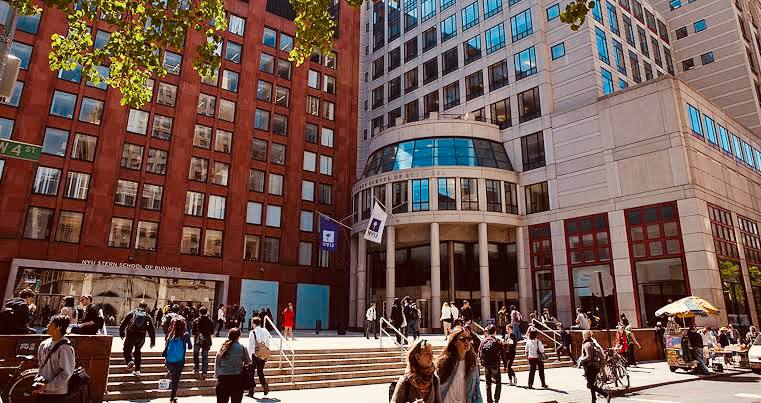The United States is a global leader in business and entrepreneurship, and its business schools play a vital role in shaping the next generation of leaders and innovators. From iconic institutions like Harvard and Stanford to cutting-edge programs in finance, marketing, and entrepreneurship, the USA is home to some of the world’s most prestigious and influential business schools. A degree from a top-ranked business school can open doors to lucrative career opportunities, powerful networks, and unparalleled access to industry expertise. In this article, we’ll be showing you the top 10 business schools in the USA among other relevant information.
Factors to Consider when Choosing a Business School
-
Accreditation and Prestige
Credibility by internationally recognized bodies, including the Association to Advance Collegiate Schools of Business (AACSB), the European Quality Improvement System (EQUIS), and the Association of MBAs (AMBA), is a key mark of a good business school. These accreditations are the assurance that the school is able to meet high standards in relation to curriculum, faculty qualifications, and student services. A school’s reputation is a deciding factor in your future. The employers usually evaluate the reputation of the business school while making the hiring decisions. Some reputable ranking organizations like the Financial Times, The Economist, and U. S. News & World Report can help you understand a school’s place in the business education sphere.
-
Programs and Specializations
Find out whether the school has different programs, for example, MBA, Executive MBA, or specialized master’s degrees (depending on your career stage and goal). Think about whether the school has specializations or concentrations that are in line with your career interests, like finance, marketing, entrepreneurship, international business, or technology management, among others. The possibility of taking part in specific courses can help you grow mastery in the area of your choice.
-
Faculty and Resources
The faculty qualifications, industry experience, and research contributions are very important factors. Seasoned teachers who are industry leaders can share their unique perspectives, mentor, and offer networking platforms. Assess the school’s resources, which comprise research centers, libraries, laboratories, and the latest technology access. These resources may change your learning process for the better and equip you with the necessary skills and know-how.
-
Networking and Career Support
An alumni network with strong connections to industry leaders can be an advantage for career advancement. Schools that have frequent networking events, guest speakers, and partnerships with the industry offer their students avenues to build their professional contacts. Career services that are functioning well, which include resume workshops, interview preparation, job fairs, and personalized career counseling, can ensure the availability of internships and job placements. Explore the school’s background in helping graduates attain their job objectives.
-
Location and Environment
Where the school is located can influence your educational experience and lifestyle. Being in close vicinity to key business firms can promise extra placements for internships, networking, and jobs. Consider the cost of living in the area, housing options, and the overall quality of life. The environment of the school in terms of culture and social aspects needs to match your taste. Some people enjoy an urban lifestyle in an active environment; others prefer a campus-oriented environment in a more tranquil setting. Diversity in the cultural backgrounds of students and the inclusiveness of the campus will also broaden your experience.

Top 10 Business Schools in the USA
-
Harvard Business School
Average Tuition Fees: $74,910
The Harvard Business School is generally known as the peak of business education. Its unique case-study approach and outstanding faculty differentiate it from other schools. HBS provides a hands-on learning environment that directs students to think critically and use what they learn to address the challenges they face daily. The outstanding Harvard alumni network and the strong brand name strongly contribute to its being one of the leading business schools worldwide. The HBS students are the envy of many aspiring MBA students who come from different parts of the world. The school offers a full-time MBA program, a doctoral program, and over 80 executive education programs. It is the best business school in many ranking systems in the U. S. and worldwide. Harvard Business School provides a 2-year residential MBA program, eight in-residence PhD programs, and a variety of executive education courses.
-
Yale University
Average Tuition Fees: $78,850
The Yale School of Management offers many departments and fields such as accounting, consultancy, economics, entrepreneurship, ethics, finance, general management, health care administration, human resource management, international business, leadership, marketing, not-for-profit management, production/operations management, and operations research. At graduation, 81. 10% of full-time program graduates are employed. Integrated into the curriculum at the Yale MBA, students work through “raw” cases rather than standard case studies, requiring them to examine stock charts and newspaper articles among other materials. All students will take both the Leadership Development Program and the Global Studies requirement, which usually involves traveling abroad. Electives are offered in both years of the program, some of which come from within the school, and others from the highly acclaimed Yale Law School.
Furthermore, Yale SOM has a variety of academic centers, for example, the International Center for Finance, the Center for Business and Environment, and the Center for Customer Insights. Students have the chance to join many clubs that include professional development groups, sports teams, and community service organizations. The school also offers an Executive MBA for the students as well as a weekend-format program with focus areas including asset management and health care.

-
New York University – Stern School of Business
Average Tuition Fees: $84,180
The Stern School of Business at NYU creates a unique urban setting for business studies by concentrating on finance, marketing, and entrepreneurship, as well as providing students with the necessary business skills needed to compete in the world of business. Located in the centre of New York City, Stern provides an unrivalled option for networking. The school boasts multiple departments and concentrations that range from accounting to business analytics, arts administration, and consulting. Upon graduation, 85. 70% of the full-time program graduates are already employed. At Stern, MBA students are grouped into blocks of approximately 60 students, and this grouping forms the framework for their entire two-year graduate school experience. These blocks take the core courses together, lunch on Mondays, and compete in Block Olympics every year. For classes outside their home block, students can take electives from NYU’s top-ranking schools.
The MBA program includes a general management degree, and students can specialize in as many as three areas, including entrepreneurship and innovation or luxury marketing. Moreover, students may enroll for dual degrees on an accelerated basis. Stern boasts about 40 student groups and the NYC location provides vast job opportunities. Students can live in the university accommodation near campus or in any other place in Manhattan. For those seeking a different style of life, Stern provides week- or semester-long study abroad trips.
-
University of Pennsylvania – Wharton School
Average Tuition Fees: $87,370 per year (full-time)
Wharton School at the University of Pennsylvania has offerings that cut across a wide range of departments and concentrations, including accounting, business analytics, e-commerce, economics, entrepreneurship, ethics, finance, general management, and supply chain management. At graduation, 83. 90 percent of full-time program graduates are working after their graduation.
Wharton, the first business school in the U. S., has the largest alumni network in the country. Wharton also offers programs that last four to five years and cover ethics and legal studies, statistics, and applied economics, respectively. Closer to home students may gain hands-on leadership experience in around 25 research centers on campus and take part in around 150 organizations. Wharton has campuses in Philadelphia and San Francisco. Students at the Philadelphia campus often live in University City, which is also home to Drexel University and the University of the Sciences in Philadelphia.
READ ALSO:
- Top 10 Best Universities in the USA For MS in Computer Science
- Top 10 Best MBA Programs in 2024
- 10 Highest Paying Jobs for MBA Graduates 2024
-
Northwestern University (Kellogg)
Average Tuition Fees: $81,015 per year (full-time)
The Kellogg School of Management at Northwestern University provides a great variety of departmental programs including accounting, economics, entrepreneurship, finance, general management, health care administration, leadership, marketing, not-for-profit management, production/operations management, organizational behavior, portfolio management, public administration, public policy, real estate, quantitative analysis/statistics and operations research, and technology. Students pay $81,015 per year if they attend full-time, $7,872 per credit if they attend part-time, and $115,587 per year for executive students. At graduation, 85. 60 percent of full-time program graduates are employed.
Kellogg offers different types of graduate degree programs including a traditional full-time MBA degree and an evening/Saturday part-time MBA degree. Students of MBA can also acquire an additional certification like a masters degree in design innovation from the McCormick School of Engineering and Applied Science or a J. D. through Northwestern Law School. Apart from academics, students have access to numerous research centers including the General Motors Research Center for Strategy in Management and the Center for Executive Women, with the latter offering frequent guest speaker events. Kellogg has over 100 college organizations covering both academics and social groups. Evanston, Illinois, a suburb of Chicago, is where Northwestern hosts its full-time MBA program and some graduate students can reside on campus. Kellogg’s alumni network boasts over 50,000 graduates, among them Ted Phillips, president and CEO of the Chicago Bears, and Ellen Kullman, chair and CEO of DuPont.
-
University of Chicago (Booth)
Average Tuition Fees: $80,961 per year (full-time)
The Booth School of Business of the University of Chicago has various departments and areas that one can choose from. These include accounting, business analytics, consulting, e-commerce, economics, entrepreneurship, ethics, finance, general management, health care administration, human resources management, industrial management, and production/operations. For full-time students, tuition is $80,961 per year while part-time students pay $8,096 per credit and $181,076 for the full executive program. At graduation, 89. 30 percent of full-time program graduates are employed after the completion of the program.

At Booth, students have the ability to adapt the curriculum as they want. Unlike the set courses, MBA students at Booth choose courses that are in line with their personal vision. That makes the Booth MBA program more diverse and attractive. This strategy enables students to be flexible enough and not waste their time. The only mandatory course for all students is Leadership Effectiveness and Development (LEAD). Beyond this, students must complete one course in each of the three foundational areas: financial accounting, microeconomics, and statistics. Students can pick the level of these courses, which can be more suitable for those who already have good fundamentals to go to more advanced classes.
-
Stanford University
Average Tuition Fees: $79,860 per year (full-time)
The Graduate School of Business at Stanford University encompasses numerous departments and specialized areas of study, such as accounting, business analytics, e-commerce, economics, entrepreneurship, ethics, finance, general management, health care administration, human resources management, insurance, international business, leadership, manufacturing and technology management, marketing, management information systems, not-for-profit management, production/operations management, and project management. The tuition fee for the full-time program is $79,860 a year. At graduation, 60.90 percent of full-time program graduates are employed.
At Stanford University, there is a value-driven management program that delivers rigorous and practical general management education focused on principled leadership. The GSB academic experience is based on three core beliefs: First of all, a great business leader is both analytical and intuitive, so the curriculum helps to develop these dual functions. Then, the quality of the instruction is of utmost importance. Stanford GSB is not only a research institution but also a business school that provides learning for students from top researchers and great business leaders. Finally, there is no unique method of teaching as the faculty uses a variety of teaching techniques including lectures, prototyping, role-playing, panels, and debates, thus all learning is experiential and collaborative.
The MSx curriculum of Stanford University is created for the mid-career, well-experienced leaders. It enables students to bridge their knowledge gaps by taking fundamental business courses while customizing 55 percent of their academic experience from a wide variety of electives offered by the Stanford GSB. Students also have the opportunity to choose interdisciplinary electives across Stanford University to broaden their perspectives and learn in a more meaningful way that intersects with their career aspirations.

-
Massachusetts Institute of Technology (Sloan)
Average Tuition Fees: $84,200 per year (full-time)
The Sloan School of Management at the Massachusetts Institute of Technology (Sloan) has multiple departments and concentrations, including accounting, business analytics, economics, entrepreneurship, finance, general management, health care administration, human resource management, industrial management, international management, leadership, manufacturing and technology, marketing, management information systems, production/operations management, organizational behavior, supply chain management/logistics and quantitative analysis/statistics. Upon graduation, 80. 50% of full-time program graduates are employed.
Sloan graduate students may study at the Massachusetts campus, but their business education provides them with a global vision. The courses incorporate an international perspective, and the students are given many chances to travel abroad for study purposes. In addition, Sloan has Action Labs where students will work on real issues for organizations in the United States, China, and India. Thus, they get a real experience and understanding of global business issues.

-
University of California, Berkeley (Haas)
Average Tuition Fees: $67,814 (in-state)
Haas, the business school at the University of California, Berkeley (UCB) has a plethora of departments such as business analytics, consulting, e-commerce, economics, entrepreneurship, ethics, finance, general management, health care administration, international business, leadership, manufacturing and technology management, marketing, management information systems, not-for-profit management, production/operations management, organizational behavior, portfolio management. Tuition for the full-time program is $69,814 a year for in-state students and $82,059 a year for out-of-state students. Tuition for part-time students is $3,708 per credit hour, regardless of being in-state or out-of-state. For the executive program the total cost is $205,897, and for the specialty master’s program, the cost is $80,486 for both in-state and out-of-state students. At graduation, 75. 40 percent of full-time program graduates get jobs.
-
Dartmouth College (Tuck)
Average Tuition Fees: $77,520
Tuck School of Business at Dartmouth College (Tuck) offers a wide range of departments, including accounting, business analytics, consulting, e-commerce, economics, entrepreneurship, ethics, finance, general management, health care administration, human resource management, industrial management, international business, leadership, manufacturing and technology management, marketing, not-for-profit management, organizational behavior, portfolio management, public policy, real estate. The full-time tuition is $77,520 annually. At graduation, the employed graduates of the full-time program are 88.40 percent.
Tuck is popular for its tight-knit campus community which students are placed into from day one. The foundations of strong teamwork are laid with the students having to work in small study teams at the start of their program. As such, more than half of the university’s residents prefer to live on campus in Hanover, New Hampshire, creating a sense of community.
Conclusion
The top 10 business schools in the USA are truly exceptional institutions that offer students a world-class education, unparalleled resources, and a network of successful alumni and industry leaders. Whether you’re an aspiring entrepreneur, a future CEO, or a seasoned professional looking to upskill, these schools provide the knowledge, skills, and connections to help you achieve your goals. If you’re serious about taking your career to the next level, consider applying to one of these top-ranked business schools and discover the opportunities that await.








